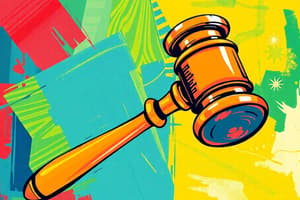Podcast
Questions and Answers
[Blank] power is essential for agencies to adapt to varying circumstances and implement policies effectively, but its scope must be defined by legal frameworks to prevent abuse and ensure accountability.
[Blank] power is essential for agencies to adapt to varying circumstances and implement policies effectively, but its scope must be defined by legal frameworks to prevent abuse and ensure accountability.
Discretionary
When administrative agencies exercise ______ without transparency, it can lead to mistrust and perceptions of unfairness among the public.
When administrative agencies exercise ______ without transparency, it can lead to mistrust and perceptions of unfairness among the public.
discretionary powers
The enforcement discretion of an agency involves determining ______, relating to regulations.
The enforcement discretion of an agency involves determining ______, relating to regulations.
when and how to enforce
[Blank] statutes often delegate discretionary authority to administrative agencies, outlining the scope and limitations of that authority within the legal framework.
[Blank] statutes often delegate discretionary authority to administrative agencies, outlining the scope and limitations of that authority within the legal framework.
Agencies use ______ to further define how discretion is to be exercised, adding layers of specificity to the application of discretionary powers.
Agencies use ______ to further define how discretion is to be exercised, adding layers of specificity to the application of discretionary powers.
Political pressures on administrative agencies may influence the exercise of ______, potentially leading to decisions that are not entirely impartial or in accordance with the law.
Political pressures on administrative agencies may influence the exercise of ______, potentially leading to decisions that are not entirely impartial or in accordance with the law.
[Blank] in the exercise of discretionary powers can lead to varying outcomes in similar situations, raising concerns about fairness and equal treatment under the law.
[Blank] in the exercise of discretionary powers can lead to varying outcomes in similar situations, raising concerns about fairness and equal treatment under the law.
[Blank] refers to laws made by bodies other than the legislature, based on powers granted to them by the legislature, allowing for efficient and adaptive governance.
[Blank] refers to laws made by bodies other than the legislature, based on powers granted to them by the legislature, allowing for efficient and adaptive governance.
Administrative agencies often have specialized knowledge, which serves as a primary reason to allow for ______.
Administrative agencies often have specialized knowledge, which serves as a primary reason to allow for ______.
Orders in delegated legislation serve to ______ or policies, providing a means for agencies to direct specific actions without legislative amendments.
Orders in delegated legislation serve to ______ or policies, providing a means for agencies to direct specific actions without legislative amendments.
For delegated legislation to be valid, it must be within the scope of authority granted by the ______, ensuring that agencies do not exceed their delegated powers.
For delegated legislation to be valid, it must be within the scope of authority granted by the ______, ensuring that agencies do not exceed their delegated powers.
[Blank] retain the power to amend or repeal the enabling legislation, providing an overarching control mechanism over delegated legislation.
[Blank] retain the power to amend or repeal the enabling legislation, providing an overarching control mechanism over delegated legislation.
Inviting and considering public feedback on proposed regulations during the process of delegated legislation ensures accountability and ______.
Inviting and considering public feedback on proposed regulations during the process of delegated legislation ensures accountability and ______.
One of the disadvantages of delegated legislation is the potential ______, as there is less direct democratic control compared to primary legislation.
One of the disadvantages of delegated legislation is the potential ______, as there is less direct democratic control compared to primary legislation.
[Blank] within delegated legislation specify when a delegated law will expire automatically, ensuring regular review and preventing outdated regulations from remaining in effect.
[Blank] within delegated legislation specify when a delegated law will expire automatically, ensuring regular review and preventing outdated regulations from remaining in effect.
Flashcards
Administrative Law
Administrative Law
The body of law that governs the activities of administrative agencies of government.
Discretionary Power
Discretionary Power
Authority granted to agencies to make decisions within defined legal boundaries, using judgment and choice.
Legislative Statutes
Legislative Statutes
Laws passed by legislatures that delegate authority to administrative agencies.
Rule-Making (Discretion)
Rule-Making (Discretion)
Signup and view all the flashcards
Enforcement (Discretion)
Enforcement (Discretion)
Signup and view all the flashcards
Adjudication (Discretion)
Adjudication (Discretion)
Signup and view all the flashcards
Procedural Requirements
Procedural Requirements
Signup and view all the flashcards
Judicial Review
Judicial Review
Signup and view all the flashcards
Delegated Legislation
Delegated Legislation
Signup and view all the flashcards
Technical Expertise
Technical Expertise
Signup and view all the flashcards
Efficiency
Efficiency
Signup and view all the flashcards
Rules and Regulations
Rules and Regulations
Signup and view all the flashcards
Bylaws
Bylaws
Signup and view all the flashcards
Scope of Authority
Scope of Authority
Signup and view all the flashcards
Legislative Control
Legislative Control
Signup and view all the flashcards
Study Notes
- Administrative law is the body of law governing administrative agencies
Discretionary Powers
- Discretionary power is a provision allowing administrative agencies the authority to make decisions and actions within a defined scope
- Exercising judgment and choice within legal boundaries is a component
- Allows agencies to adapt to different situations and implement policies effectively
- To prevent abuse of power, legal frameworks are necessary to define the scope and limitations of discretionary powers
- Administrators can choose between different courses of action with discretion
- Discretion is subject to legal principles and oversight and not absolute
- Should be exercised impartially, reasonably, and in accordance with the law
Sources of Discretionary Power
- Legislative Statutes: Authority is delegated to administrative agencies through laws passed by legislatures
- Agency Rules and Regulations: Rules are created which further define how discretion is exercised
- Case Law: Interpretation of statutes and regulations shaping the scope of discretion may be influenced by court decisions
- Nature of the Task: Flexibility and judgment is required for some tasks
Scope of Discretionary Powers
- Rule-Making: Agencies decide on specifics of regulations
- Enforcement: Determined when and how to enforce regulations
- Adjudication: Necessary decisions are made in individual cases
- Licensing: Licenses and permits are either granted or denied
- Granting Benefits: Eligibility for various government benefits are determined
Control Mechanisms of Discretionary Powers
- Procedural Requirements: Procedures must be followed to ensure fairness and transparency
- Judicial Review: To ensure decisions are lawful and reasonable, courts review agency decisions
- Transparency: Transparency in the decision-making process is required
- Political Oversight: Activities are overseen by the legislature and executive branches
- Internal Controls: Consistent decision-making is ensured by internal policies
Issues in Discretionary Powers
- Potential for Abuse: Improperly used discretionary powers may lead to arbitrary or discriminatory outcomes
- Inconsistency: Differently exercised discretion amongst administrators, may lead to inconsistent results
- Lack of Transparency: Without transparency, exercising discretionary powers breeds mistrust
- Political Influence: Exercise of discretionary powers may be influenced by political pressures
Delegated Legislation
- Refers to laws made by bodies other than the legislature based on powers granted to them by the legislature
- Administrative agencies create rules, regulations, orders, and other instruments
- Also known as subordinate legislation or secondary legislation
- Enacted under the authority of an Act of Parliament or a statute
- Enabling legislation sets the scope and limits
Reasons for Delegated Legislation
- Technical Expertise: Administrative agencies have specialized knowledge
- Efficiency: Allows quick response to changing circumstances
- Flexibility: Laws can be adapted as needed without legislative amendments
- Alleviates Legislative Burden: Reduces workload on the legislature
Types of Delegated Legislation
- Rules and Regulations: Statutory provisions are clarified and implemented
- Orders: Direct policies or specific actions
- Bylaws: Created by local authorities or other bodies with specific jurisdiction
- Schemes: Detailed plans or frameworks for specific activities
Requirements for Valid Delegated Legislation
- Within the Scope of Authority: Powers granted by the enabling legislation must be within the scope
- Consistent with the Act: Must align with the purposes and provisions of the parent act
- Procedural Compliance: Procedures such as consultation and publication, must be followed
- Reasonableness: Should be reasonable and not arbitrary
Control Mechanisms of Delegated Legislation
- Legislative Control: Power to amend or repeal enabling legislation is retained by the legislature
- Parliamentary Committees: Delegated legislation is reviewed and scrutinized
- Judicial Review: Validity is assessed to ensure compliance with the law
- Public Consultation: Feedback is invited and considered on proposed regulations
- Sunset Clauses: Provisions that specify when a delegated law will expire automatically
Advantages of Delegated Legislation
- Adaptability: Can be quickly adapted to changing circumstances
- Efficiency: Policies are implemented faster compared to primary legislation
- Technical Specialization: Benefits from the expertise of administrative agencies
- Reduced Legislative Burden: Legislature can then focus on broader policy issues
Disadvantages of Delegated Legislation
- Lack of Democratic Input: Less direct democratic control compared to primary legislation
- Potential for Abuse: Risk of agencies exceeding their delegated authority
- Complexity: Can lead to a complex and confusing legal landscape
- Reduced Transparency: May not be as transparent as primary legislation
Studying That Suits You
Use AI to generate personalized quizzes and flashcards to suit your learning preferences.
Description
Explore discretionary powers in administrative law. Learn about the sources of this power, including legislative statutes and agency rules. Understand how agencies adapt, make informed decisions, and implement policies effectively within legal boundaries.




